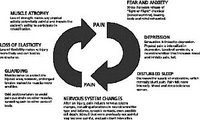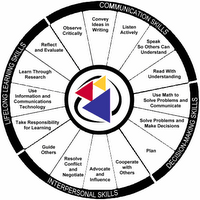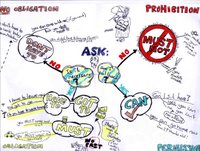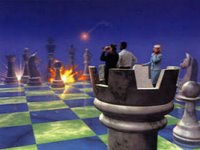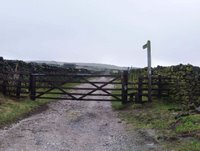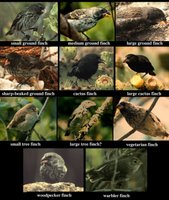

Thoughts and points - tasks and activities
From a workshop given by Mario Rinvolucri on 26th March 2006 at UAE University
“True genius is a mind of large general powers,
accidentally determined to some particular direction”
Samuel Johnson
It was fortunate that Hans Lal - a representative on the University’s Professional Development Committee - managed to persuade Mario to come to UAE University today to give this useful workshop on using multiple intelligences in the learning environment.
Clarity of thought and the ability to draw upon different facets of one’s intelligence is vitally important when it comes to making decisions that affect the country, and as today’s undergraduates may well become tomorrow’s professionals, leaders, and captains of industry; their ability to think critically and realize their full potential is indeed vital.
The University General Requirements Unit (UGRU) is about to embark on courses designed to develop students critical thinking ability; vital in the world we live in, as well as in studies at university. Mario’s workshop gave thirty teachers plenty to think about this evening.
Going through the tasks set out below might go some way to helping you realize that there is something going on in your mind or the mind of your children besides what is traditionally thought or expected.
Drawing upon the work of Dr. Howard Gardner, and applying it to teaching situations, Mario Rinvolucri illustrates the eight different intelligences proposed by Dr. Gardner by animated and highly instructive and enjoyable activities which ensure the success of the workshop as a learning experience for participants.
The eight different intelligences proposed by Dr. Gardner are:
Linguistic intelligence (“word smart”)
This ‘intelligence’ is the one traditionally tested at schools, colleges and universities. Typically, students write essays or complete grammar exercises to indicate their ability in English or their mother tongue.
Task: ‘Mexican wave’ sentences
This activity needs several people – each person has to be a word, a punctuation mark or a phoneme (like the ‘s’ on third person singular verbs –
‘She likes ice cream.’)
Take a paragraph about Dubai, for example, and ‘act’ out your own part as the sentence unfolds – stand in a row with the others in the order of the words in your sentence. When it comes to your bit, speak, act, or do both. Enjoy language like never before – learn from your enjoyment – tell me you didn’t enjoy the exercise, the limits of the task, the physical act of becoming a word, and now think how you can improve your language – start with questions – what happens to word order in questions – start to sound like a native speaker, instead of mumbling your way through life – stand up, speak and move – enjoy and learn!
Logical-mathematical intelligence (“number/reasoning smart”)
Here, a student’s ability to solve mathematical problems is tested, and it is this ‘intelligence’ and linguistic intelligence that are used to determine whether, for instance, a student progresses from high school into higher education. University entrance examinations the world over test students in these two areas. Should the following types of intelligence count for anything?
Task 1. ‘Meet you in the middle’
With a partner, count in turns down from 100 and up from zero – in twos, then in threes, fours or whatever you can manage. Feeling your way around numbers is one way not to be intimidated by them. How many of us have faltered at even the appearance of numbers on a sheet of paper. This activity is fun to do as well as being helpful.
Now invent similar games with other lists – stations on the Bakerloo line (or the Dubai line when it’s up and running), words in well known nursery rhymes or poems – make something up – share it – memorise and play – increase your memory, and the space you feel comfortable in – linguistic, numerical, spatial, intrapersonal – be inventive and creative – find out what you have a flair for, what your child is brilliant at – you’ll be surprised what you uncover – it’s always been there, it’s just that you haven’t ever been encouraged to look for it.
Spatial intelligence (“picture smart”)
If your child shows some ability to draw pictures, or manages to find his way round shopping malls without your help, for instance, he might be gifted in spatial intelligence. Parents should encourage any talent they see in their children, and teachers too would do well to look out for students who show aptitude in this area. It used to be said that if you were good at art, you were not so good at maths – is that really true, or just a sort of self-fulfilling prophesy used by teachers and parents who do not encourage artistic ability when they see it?
Task: ‘Let your eyes remember’
Listen to the following words – draw something to represent each word you hear. Do it quickly and alone. After you have finished, compare your drawings with those of other people. You will be amazed to find you have a lot in common, but some drawings will be yours and yours alone.
Here are the words: TRUST – PHILOSOPHY – LANGUAGE – SING – DEMOCRACY - VEGETABLES – TRANSPORT
Task 2. After you have compared your sketches, put the piece of paper away for several days. After three days, try to recall the words – think of the pictures you drew to help you if you can’t remember every word. This list of 7 very different words will be hard to remember – remember the shapes you drew, and you will recall the words. Use your Spatial Intelligence in a conscious way.
Everybody uses theirs unconsciously every day – if we didn’t we wouldn’t last out the day.
Bodily-Kinesthetic intelligence (“body smart”)
Ballet dancers, gymnasts, footballers, horse riders – all sorts of people who have the ability to be graceful in their movements may possess this sort of intelligence. Remember Billy Eliot in the film of the same name – boys traditionally play masculine sports like football and rugby, and girls take up lessons in ballet dancing, but does it have to be that way – always – for every child? A talent is something divine and should be nurtured, despite our more earth- bound prejudices about who can or should be good at what.
We speak, for example, of being "touched," "taken," "gripped," "led," "held." We "grapple" with difficult subjects, and have "gut wrenching" experiences. Our stomachs turn. Our hearts leap. Our breathing quickens. We may tremble, sigh, and be "moved." These responses are rooted in kinesthetic experience.
http://www.longleaf.net/ggrow/7In/Bodily.html
Task: Answer by demonstrating
1. I learn a skill by doing it.
2. I can't sit still long.
3. I like to move around when I am learning something.
4. I like activities that involve movement.
5. I like the rides at amusement parks.
6. I like to do things that are physically active.
7. I like to touch things.
8. I mimic other people's gestures accurately.
9. I am well coordinated.
10. I am animated and expressive when I talk.
11. I like working with my hands.
12. I would rather drive than ride.
13. I enjoy creating things with my hands.
14. I write things down to remember.
15. I often touch others when talking to them.
These statements indicate kinesthetic intelligence –
Task 2: Rank the statements in order of importance to yourself – compare your rankings with others – who appears to be more kinesthetically intelligent – how can you tell – write down some of the ways this type of intelligence is demonstrated:
By yourself
By people you know well
Compare your findings – what do they tell you about yourselves?
Both scientists and educators are realizing that early, positive musical experience is uniquely effective in helping children achieve their full potential intellectually, artistically and emotionally.
Intelligence associated with musical understanding does not always relate to superior levels of achievement in other academic areas. Yet MI theory holds that the nurturing and development that takes place in musical learning is autonomous and on par with the processes that take place in studying languages, mathematics and the sciences (Potter, 1997)
http://ijea.asu.edu/v2n4/
Musical intelligence (“music smart”)
If Mozart had not been encouraged in his supreme musical ability, the world might have been deprived of a true genius and his work may never have been written, played and enjoyed. Who knows how many gifted people have been thwarted in their ambitions because either a teacher or a parent did not say the right thing at the right time. You may say that true genius will always come to the surface, that truly gifted people will always get there eventually, but is that always true, and why run the risk of missing talent or more in your children?
Task: ‘Take up your instruments, ladies and gentlemen!’
This activity will help cure your inhibitions – they could be preventing you from discovering who you really are – but don’t worry – do it with your eyes closed first.
Imagine you are about to perform a piece of music you know and love. Close your eyes and begin – beat those drums like Ringo Starr, play the violin like Menhuin, cdance like John Travolta, conduct an orchestra like Sir Simon Rattle, do anything – nobody’s looking – enjoy the feel of the music guiding your movements – come alive – feel free and dynamic – laugh – everyone in the group will laugh with you – feel your power to enjoy music, movement and expression.
Interpersonal intelligence (“people smart”)
The ability to communicate with others is vital, especially in a world in which communication is everywhere and in everything. Again, the great communicators in our world have managed to reach the fore, but this ability is one which everyone can quickly and easily use, can still improve upon and excel in. In today’s world, success is driven by this ability perhaps more than any of the others. It makes sense to encourage everyone to talk to each other, to express themselves and to realize who they truly are or are capable of becoming, and communicating well is fun too.
Task: ‘You’re talking- I’m talking – Hey, we’re getting on so much better now!’
Send half the group out of the room – when they return, engage them in conversation and speak at their pace rather than your own – feel their speed and speak at the same rate – feel how near you have become – they will feel it too – this is largely an unconscious exercise for one of you, but even for the one who knows what is going on, it will have unexpected results – you will feel different about that person. Agree with the man who once said, “I never met a person I didn’t like.” Try it with people you are not quite as friendly as you would like to be.
Intrapersonal intelligence (“self smart”)
The ability to know yourself, to know who you are, what you are and what you want and are capable of is the key to unlocking the other intelligences within you. Health, both physical and psychological, is improved and maintained through self-knowledge – through the intelligence that allows us to instinctively know when things are going well and when things are otherwise with us.
Task: ‘Be where you want to be!’
Stand up – close your eyes – imagine you are looking out over a vista – where is it? – what is it? – you decide – smell the salty air of the Atlantic – the chill of the snowfields half way up Everest, the heat of the Kalahari Desert – the sounds of London’s Piccadilly – your own secret garden only you have the key to – imagine what you see- hear- feel – who you meet – what you become – what you achieve there!
Naturalist intelligence (“nature smart”)
This type of intelligence is demonstrated by a child’s ability to use the world of nature. Showing an interest in animals, for instance, would indicate that a child has this form of intelligence.
Children possessing this type of intelligence may have a strong affinity to the outside world or to animals, and this interest often begins at an early age. They may enjoy subjects, shows and stories that deal with animals or natural phenomena.
http://www.uwsp.edu/Education/lwilson/learning/natintel.htm
Task: Hopping and naming
For this activity, you will need plenty of space – it’s best done outside where no one can get hurt. Place large circles on the ground (within hopping distance) – one person at a time hops and counts as they hop – then names an animal as they hop.
Others can cheer on the participant as they wait for their turn. Watch out for the child who completes the task easily and quickly, taking little time to think up the name of an animal before they hop to the next circle – adults watching could count and keep a check on the time it takes each child to get through the circles – this could easily be made into a team game – spontaneity is the thing to watch out for and encourage here.
A variety of activities in the classroom, on the sports-field, in the library, outdoors can invite anyone to ‘go into parts of the mind normally used to process things in other ways’ – to find out whether you or your children have hidden talents.
The benefits of music include:
~ Extending the neural networks in the brain
~ Sound discrimination which leads to spelling success
~ Increased vocabulary
~ Abstract and spatial reasoning which leads to math success
~ Improved coordination
~ Better concentration skills
~ Sharper memory
~ More focused listening skills
In Mario’s workshop, some teachers were initially somewhat perplexed by what was expected of them – why they were being asked to do certain things. However, once the activities got started, all became apparent and clear.
You don’t know what you can do until you have a go, and you might also imagine yourself in capable of other things prior to taking part – finding out is everything – in the classroom and elsewhere – try it.
Group members readily identified with certain points in the talk, recounting similar experiences that accorded with points made by the speaker.
In effect, Mario’s main point throughout the workshop was that there are other ways of teaching any subject - in conventional schooling, people who learn in ways other than linguistically and logically are not always catered for in recognized teaching methodologies and testing tools.
To illustrate points made, Mario demonstrated teaching techniques that utilize ability from the other six intelligences. Forms of irregular verbs, for example, were taught using body movements instead of words on the board, and it became clear that otherwise drab lessons on uninteresting subjects can be livened up to make them more
Finally, and urging teachers not to use symbols and learning devices and mnemonics, for example, that are culturally unacceptable or which fly in the face of conventional logic, Mario rounded off an enjoyable and informative evening with exercises designed to allow students to find out something about their own, preferred way of learning.
Everyone almost certainly came away knowing something more about themselves and how they best learn, and how to use this to teach in ways that exploit the multiple intelligences that may or may not be dormant in all of us, I know I did.
TRY IT – GO TO -
The Rogers Indicator of Multiple Intelligences at:-
http://quizfarm.com/test.php?q_id=1343
Robert L. Fielding

